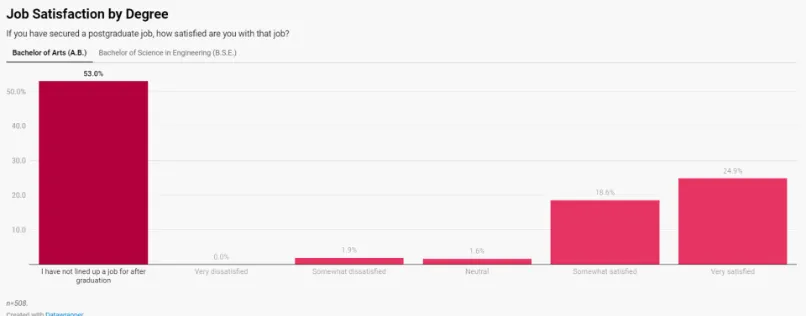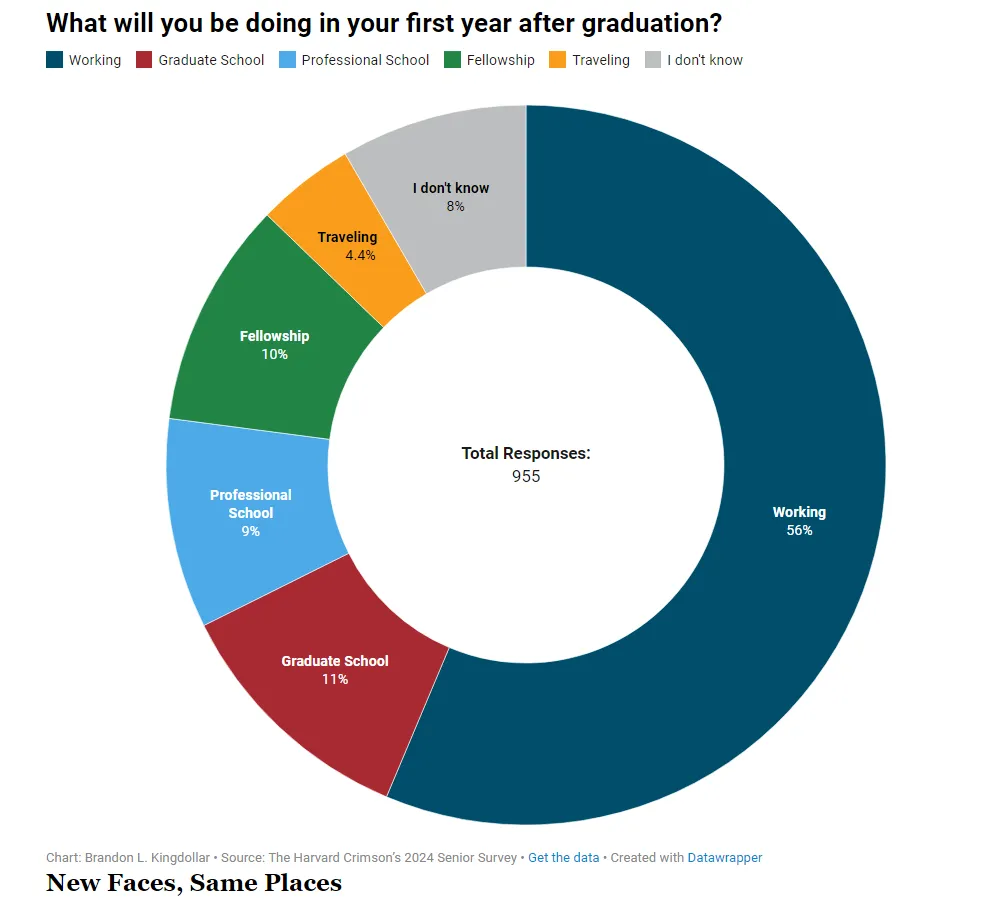In May this year, Peter Coy, a columnist for the New York Times, published two consecutive articles (Article 1: Why Can't College Grads Find Jobs? Here Are Some Theories — and Fixes., Article 2: Highly Educated Grads Can't Find Jobs. What's Happening?), focusing on the difficulties faced by American college graduates in finding employment.
When Peter Coy collected graduates' job-hunting experiences, he received a lot of sad stories: unanswered applications, lowered expectations, and some even pessimistically said that they felt that going to college was a waste of time and money.
During the interview, John York was a student who was about to get a master's degree in mathematics from New York University. He had a patent and passed the Chartered Financial Analyst exam. Even with such a background, after submitting nearly 400 applications, he received less than 40 responses, and all of them were rejection letters. He doubted that he could find a job because there were no entry-level positions at all. He said, "It was silent, and every time I filled out an application, it felt like I was shouting into the air."
Another student, Mauricio Naranjo, is looking for a job as a graphic designer. In the past year, he has submitted more than 400 applications, but has received mostly AI-generated responses: "Unfortunately, we have already selected another candidate who is more qualified." Even these responses are rare, and most do not respond at all.
Beth Donnelly, who is fluent in three languages, has been looking for full-time, part-time or internship positions after graduation since early August, and she had to gradually lower her "salary expectations" to $35,000 a year, hoping that at least one person would think, "Oh, I don't have to pay this person that much, so he got a little advantage in the hiring process."
Data from Princeton University's official website shows:
More than half (53%) of liberal arts undergraduates are unemployed;
The employment situation of science and engineering majors is better, with only 25.4% of students unable to find a job. However, there are still 28.9% of students who are dissatisfied with their jobs.

A survey of 955 graduates from Harvard University showed that less than 60% of graduates chose to work. If the job search situation was ideal, such a low proportion of graduates would not choose to enter the workplace.

Data from The Harvard Crimson
Matt Sigelman, a visiting scholar at Harvard Kennedy School, said four months ago that even in a hot job market, 52% graduates found jobs that did not require a college degree. Worse, those graduates who started out underemployed rarely found jobs that required their degrees, resulting in them earning $20,000 less per year than their classmates, a gap that persists throughout their careers.
Canada, to the north of the United States, is not optimistic either: Jenna Benchetrit in CBC NewsarticleSurya Nareshan, an engineering physics graduate from Carleton University, has applied for more than 80 positions since graduating in May 2023, but has only had a few interviews. "I've applied for more than 80 jobs, but often get no responses," he said. Analysis by RBC Economics shows that a large part of the increase in Canada's overall unemployment rate since April last year is due to new job seekers - young people like Nareshan and recent graduates - spending more time looking for jobs. Data shows that employment for young people aged 15 to 24 has barely grown since December 2022.
In addition, Benchetrit was on CBC NewsarticleIt also pointed out that among students who returned to school, the employment rate in June 2024 was 46.8%, the lowest level since 1998, except for 2020, the first year of the epidemic. The data also showed that students faced more difficulties in the summer job market, especially in the catering and hotel industries.
Looking at this year as a whole, university graduates around the world seem to have been collectively cast under a curse and are collectively trapped in the desperate situation of being unable to find a job.
They can be said to be the most desperate generation, which makes people sad and distressed.
However, data released by the U.S. Department of Labor in early June showed that the national unemployment rate was around 4%, 272,000 new jobs were added in May, and the labor market continued to remain relatively strong; the average hourly wage rose by 4.1% year-on-year in May, both of which exceeded previous expectations. On the other hand, Canadian statistics show that the employment rate of young people has gradually recovered after reaching a historical low in May 2022, but the current market is still challenging for new graduates.
All data confirm that the labor market is recovering.
But why do so many graduates still have difficulty finding jobs? The media and experts believe that
1. There is a mismatch between shortage of positions and graduates’ goals.
There are indeed some staff shortages in the current job market, but they are mainly in low-skilled jobs, such as construction, service, farms, restaurants, daycare schools, nursing homes, administration, customer support, etc., which are obviously not the target industries for college graduates.
Second, there are fewer available jobs and a lower recruitment rate.
Although unemployment is low, job quits are also falling, so fewer jobs are available, according to the Bureau of Labor Statistics. LinkedIn's estimate of the national hiring rate for April was 9.51% lower than the same period last year.
3. The high-tech, financial, consulting and media industries that are popular among college students have been continuously laying off employees and reducing recruitment plans in the past two years.
According to Layoffs.fyi, a company that tracks layoffs at global high-tech companies, 293 high-tech companies around the world have laid off a total of 84,060 people in the first four months of this year. In the San Francisco Bay Area, California, the high-tech industry has laid off 19,533 people this year, with Cisco laying off the most, at 4,250. In addition, cloud computing company VMWare laid off 2,837 people, PayPal laid off 2,500 people, gaming platform Unity laid off 1,800 people, and Google laid off 1,257 people. Tesla CEO Musk announced in April that at least 10% (14,000 people) would be laid off, but given that car deliveries fell by 20% from the fourth quarter of last year to the first quarter of this year, insiders analyzed that the actual number of layoffs may exceed 20,000.
In 2023, 262,600 people left the global technology industry, far exceeding the 164,900 in 2022. The companies with the most layoffs were Amazon (27,000), social media platform Meta (21,000), Google (12,000) and Microsoft (11,000). Other American high-tech companies that have made large-scale layoffs after the epidemic include SAP America and Apple.
Amid the “deal drought” on Wall Street, the six largest banks – Bank of America, Citigroup, Goldman Sachs, JPMorgan Chase, Morgan Stanley and Wells Fargo – laid off about 21,000 employees in the first half of last year. The cold winter is still going on.
Similar situations exist in other popular industries.

Fourth, the workplace requires graduates to create real value immediately. Employers tend to recruit experienced employees and are more distrustful, cautious, and demanding of fresh graduates.
Experts on Goldman Sachs' economic team believe there may be several potential reasons, including that the 2024 graduates studied remotely during the COVID-19 pandemic, which may have affected their training, interpersonal networks, and accumulation of human and social capital.
Work experience during college is crucial to finding the first job, which has led to the paradox of "using work experience to find a job". It is also regrettable that "four years of college are spent looking for a job" and "four years of college are spent just to get a job".
5. Too many job seekers make it harder to stand out and be seen. Personal connections are crucial.
Simply submitting a resume and cover letter to a company's job portal has a low probability of success, especially now. It has become so easy to submit an application that you are overwhelmed by thousands of applications. It is impossible for humans to review all applications, and computer reviews simply search for keywords without understanding the applicant's characteristics or the employer's needs in any profound way.
“The better you write, the more likely you are to get rejected because you won’t be using the keywords that the hiring algorithm is looking for,” said Nick Kolkodoros, a recruiter who runs the website Ask the Headhunter. He recommends not sending out broad applications, but focusing on a few companies, researching them in depth, and contacting various people associated with them, including their suppliers and customers.
In April this year, Forbes magazine conducted a survey on employers' views on hiring talent. Recruiting managers were asked about their views on graduates from public universities and graduates from non-Ivy League private universities:
According to a Forbes survey in April, among the hiring managers with direct hiring power, 42% said they are now more inclined to hire graduates from public universities; 37% said they are more inclined to hire graduates from private universities that are not Ivy League schools, which is an increase compared to five years ago; only 7% said they are more willing to hire Ivy League graduates than before, and employers are increasingly inclined to recruit the best performing professionals from other institutions, which Forbes calls "New Ivy League". Only 14% gave similar praise to the Ivy League, and 20% said that the Ivy League performed worse, which is the only part where negative evaluations of job preparation trends exceeded positive evaluations.
The way out is the baton and guide for many people. In this case, how long will the famous schools and popular majors sought after by Chinese parents remain popular?
Do we need to reflect on the nature of university education and return to ourselves to make different choices?